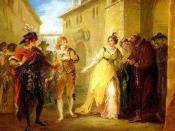'Good comedies always touch on troubling themes and envisage darker ends than are finally delivered.'
To what extent is this true of Twelfth Night?
It would be hard to argue that the central theme of Twelfth Night is not simply love and its fulfilment and to subsequently view the play as a set of comic capers which lead to this, or simply 'a ripe love comedy with a happy ending'#. The reader/audience is taken on a romp through a make believe land where no one is as they seem and where intrigue and disguise abound. As the fool Feste tells us: '.....Nothing that is so is so.'# To argue against the plays intrinsic frivolity and light heartedness would at the outset seem problematic.
Although Twelfth Night is set in the invented land of Illyria, it is not blatantly set in a land of magic and spells (like the wood outside Athens in A Midsummer Night's Dream).
Instead of giving us fanciful fairies, Shakespeare gives us almost fanciful personalities, rooted in about the same amount of reality as Titania or Oberon.
'If music be the food of love, play on,
Give me excess of it: that, surfeiting,
The appetite may sicken, and so die....'
From his opening lines, Orsino seems more in love with the idea of love itself than with a particular person. This seems further reinforced by noting that he does not mention the object of his love Olivia until line 19 of his speech. On meeting Olivia, we also discover that she is not quite what she has been made out to be. We have been told that:
'The element itself, till seven years hence,
Shall not behold her face at ample view;
But like a cloistress she will veiled walk,
And water once a day her...


